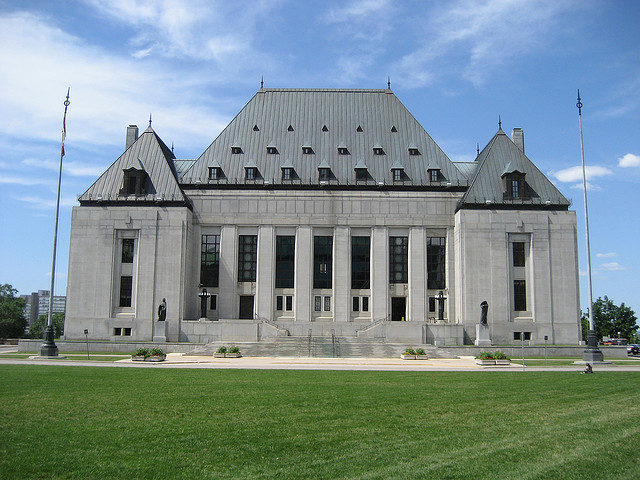In the last three months Albertans have witnessed a shocking display of raw power. The Redford government called it “delivering the responsible change Albertans voted for.” The rest of us call it the abuse of majority power to crush the rights of environmentalists, land owners and labour unions.
Black November
In November 2013 the Supreme Court of Canada…got that…the Supreme Court of Canada…struck down Alberta’s Personal Information Protection Act in its entirety because it prevented a union from videotaping replacement workers crossing a picket line and posting the video online. The Court said this infringed the union’s Charter right to communicate its cause to the public.
Within days of receiving the Supreme Court of Canada’s decision, the Redford government slammed through legislation that arguably violates the unions’ Charter rights…again.
Either they’ve learned nothing or they really don’t care.
On November 27 the government introduced Bill 46, the Public Service Salary Restraint Act, which imposed the 2011 Collective Agreement (with some minor salary tweaks) on the Alberta Union of Public Employees (AUPE) if it didn’t settle with the government by January 31, 2014.
Most importantly, the Act vapourized the compulsory arbitration rights Peter Lougheed granted to the unions back in the halcyon days when progressive conservatism actually meant something.
Then just to make sure everyone understood who carries the truncheon here, the Redford government limited debate, invoked closure and rammed Bill 46 into law less than a month after it hit the House agenda.
The AUPE sued, arguing that Bill 46 breached the Charter. It requested an injunction to suspend the law and allow the compulsory arbitration process to continue.*
Justice Thomas granted the injunction, crisply stating that Bill 46 “guts the bargaining process” by removing the only leverage the union has — the right to compulsory arbitration. Furthermore, Bill 46 violates section 2(d) of the Charter which protects the union’s right to “good faith bargaining,” something that had been sorely lacking on the government’s part.
The government is “disappointed” and will appeal the decision. This case, like the last one, will go all the way to the Supreme Court of Canada.
For once it’s not Mr. Lucaszuk’s fault
Some have tried to pin this on Jobs, Skills, etc and so on Minister Lucaszuk, a man known for his lack of empathy toward unions, higher education and anything else that refuses to roll over when they see him coming, but this time it’s not his fault.
Vetting proposed legislation is a legal function. In addition to a caucus full of QCs, the Redford government has a flotilla of legal advisors starting with Justice Minister Jonathan Denis.
One of Justice Minister Denis (clumsily worded) goals is to provide “strategic legal advice and counsel to government to achieve Government of Alberta outcomes to achieve their objectives through provision of effective legal and related strategic services.”
Mr Denis achieves this goal by relying heavily on his Legislative Counsel.
But if Alberta’s Legislative Counsel is governed by the same policies that govern their federal counterparts, we’re in terrible trouble.
The sacrifice of Edgar Schmidt
Edgar Schmidt, a federal Department of Justice lawyer, sued the Minister of Justice and his Deputy Minister for violating their obligation to examine proposed legislation and advise the House if it’s inconsistent with the Charter and Bill of Rights.**
The minute Mr. Schmidt filed his claim he lost his job and is now on a reduced pension.
The Justice Minister’s defence is that under departmental policy if the proposed law hasat least a five per cent chance of surviving a court challenge he has no obligation to alert the House that the law may be illegal.
Or to put it another way, even if a proposed law has a 94 per cent chance of being struck down for violating the two Acts that protect our fundamental rights and freedoms it will be sent to the House and (given the tyranny of the majority) proclaimed into law.
As a result of this policy, the burden of vetting bills to ensure that they’re legal falls to the people. It is our job to ferret out legislation that breaches our fundamental rights and hire lawyers and file lawsuits to get that legislation overturned in a court of law. Thanks to Mr Schmidt’s sacrifice we now know that.
The canary in the mineshaft
We won’t know with certainty whether Bill 46 violates the Charter until the Supreme Court of Canada tells us so. We may never know whether Justice Minister Denis has adopted the five per cent Rule to slide unlawful bills into law by virtue of his government’s majority power.
But we do know this: government lawyers, like all lawyers, are bound by a duty to give honest advice (even if their clients don’t want to hear it). Government lawyers, like all lawyers must ensure that their clients don’t unlawfully inflict harm on innocent citizens.
In essence government lawyers are canaries in the mineshaft. If they are aware of policies that result in laws that damage our fundamental rights, they need to speak up.
It’s a matter of conscience.
*Alberta Union of Public Employees v Alberta 2014, ABQB97
**National Nov/Dec 2013 p 18
This post originally appeared on Susan on the Soapbox and is reprinted with permission.
Susan Wright is a lawyer with 26 years of experience in petrochemicals, pipelines, oil and natural gas.
Photo: flickr/detsang




